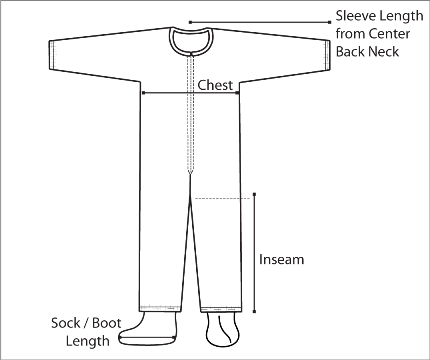QS127T GR
DuPont™ Tychem® 2000 SFR
DuPont™ Tychem® 2000 SFR Hooded Coverall. Offers chemical and secondary flame protection in a lightweight garment. Must be worn over appropriate primary FR clothing. Green coverall features an attached respirator fit hood, a front zipper closure, chin flap, storm flap, elastic wrists, ankles, and waist, a semi-auto locking slider zipper pull, and taped seams. Suitable for refineries, petrochemical plants, laboratories, and hazardous maintenance operations.
DUPONT™ SAFESPEC™ Terms of Use
Product Selector Agreement
The following information must be read and accepted by the user before proceeding.
The DuPont™ SafeSPEC™ Product Selector Tool (“Tool”) is intended to assist in choosing protective clothing styles for particular applications and does not replace the judgment of a qualified safety professional or industrial hygienist. Additional personal protective equipment (“PPE”), such as but not limited to: respiratory, eye, head, foot, and hand protection, may be required. Supplying the proper hazard/chemical and exposure information for your hazard scenario is critical in order to obtain suggestions of possible garment options for your consideration. Inaccurate information could result in improper suggestions. Since there are other factors involved which could affect the final PPE decision and may not be considered in this Tool, the final decision on protective clothing selection is the responsibility of the buyer, safety professional, industrial hygienist and end-user. DuPont de Nemours, Inc. or its affiliates DISCLAIM ANY RESPONSIBILITY OR LIABILITY FOR ANY INFORMATION OR SUGGESTIONS PROVIDED BY THE TOOL OR THE USE THEREOF.
WARNING / CAUTION
There are uses, environments and chemicals for which any garment will be unsuitable. It is the responsibility of the user to review available data and verify that the garment selected is appropriate for the intended use and meets all specified government and industry standards.
Search by :
1 Choose Hazards
1 Enter
Chemicals
2 View Permeation Data
2 View
Data
3 View Matching Products
3 View
Products
Step 1 of 3
You may enter from one to five chemicals or other hazards that may be present in your working environment. Our tool will find the best product match for the combined hazards. Enter a single chemical or hazard if you wish to find the best possible product match for that one hazard.
Chemical or Other Hazard Name
or
CAS Number
| Chemical Details | CAS | Actions |
|---|
1 Choose Hazards
1 Enter
Chemicals
2 View Permeation Data
2 View
Data
3 View Matching Products
3 View
Products
Step 2 of 3
CHEMICAL COMPARISON
The table below shows the Normalized Breakthrough times of fabrics for the hazards selected. (Testing Details) You can find specific garments that protect against these hazards by clicking the 'Next' button below.
Done
Done
Done
|
|
|
|
||||||||||
|---|---|---|---|---|---|---|---|---|---|---|---|---|
1 Choose Hazards
1 Enter
Chemicals
2 View Permeation Data
2 View
Data
3 View Matching Products
3 View
Products
Step 3 of 3
1 Choose Hazards
1 Enter
Chemicals
2 View Permeation Data
2 View
Data
3 View Matching Products
3 View
Products
step3of3
 Is Suitable For Hazard Scenario
Is Suitable For Hazard Scenario
 Is Not Suitable For Hazard Scenario
Is Not Suitable For Hazard Scenario
| Hazard | Fabric/Materials | Seam | Design |
|---|
For a general fabric overview, please view our
 Is Suitable For Hazard Scenario
Is Suitable For Hazard Scenario
 Is Not Suitable For Hazard Scenario
Is Not Suitable For Hazard Scenario
| Hazard | Fabric/Materials | Seam | Design |
|---|
For a general fabric overview, please view our
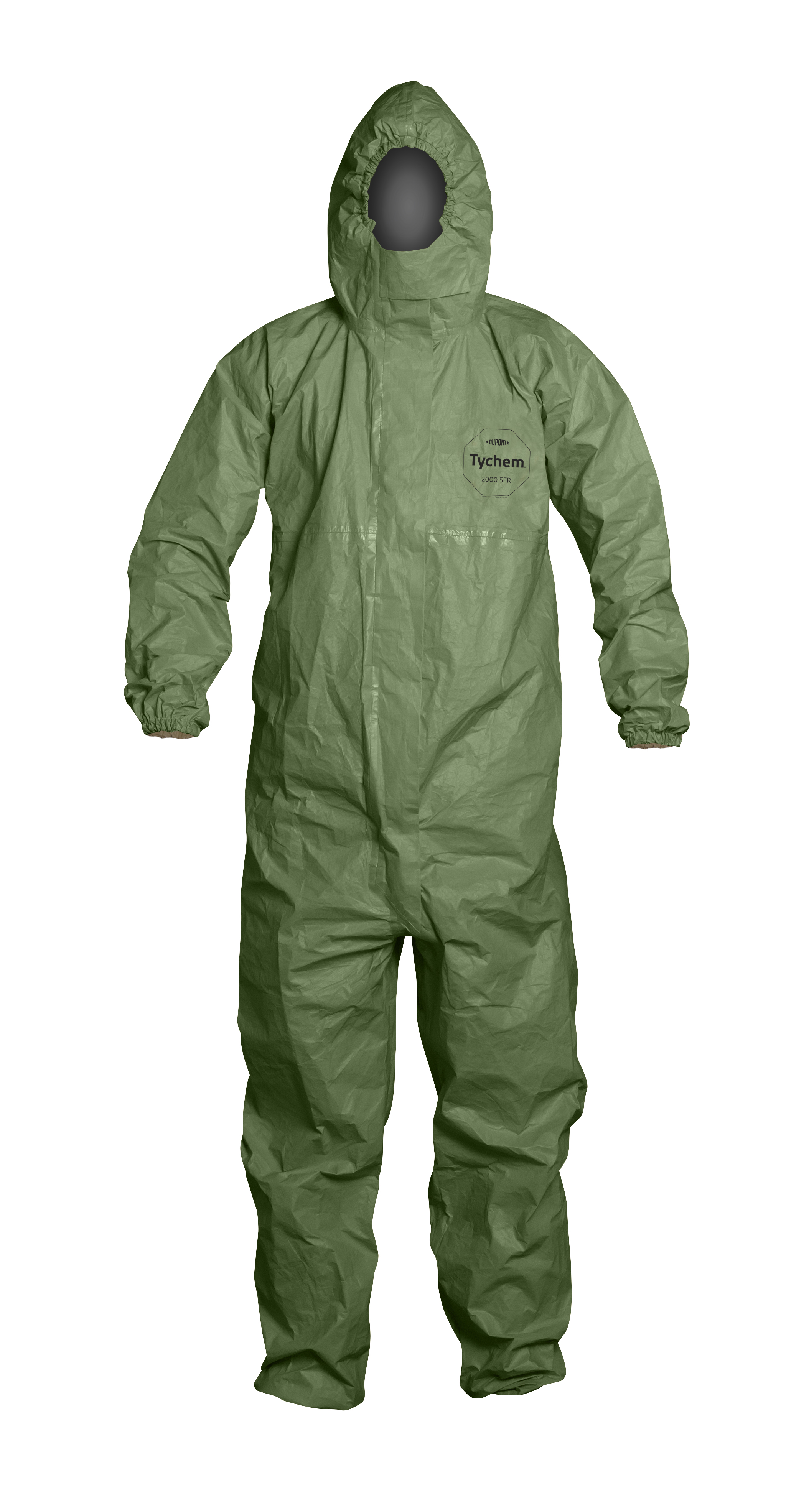
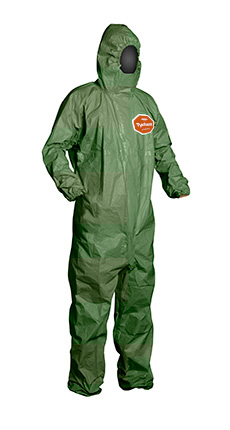
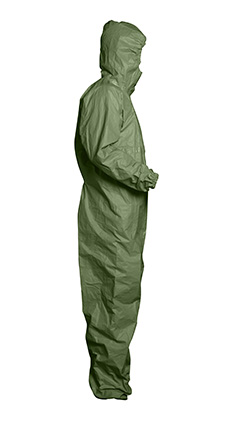
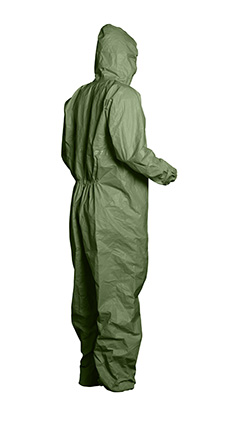
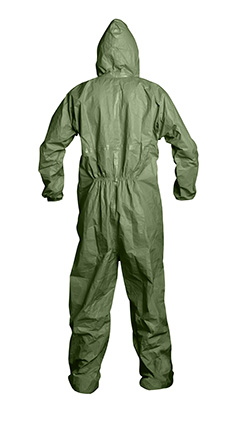
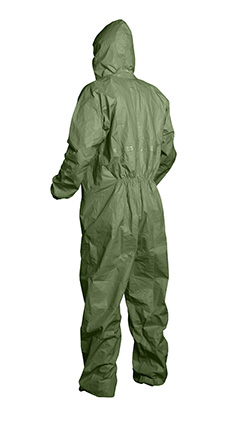
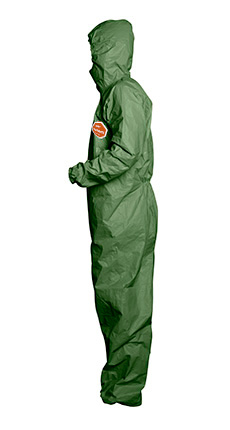
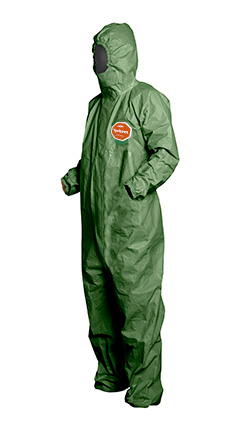
FEATURES & PRODUCT DETAILS
Tychem® 2000 SFR provides chemical and secondary flame protection in a lightweight garment. Tychem® 2000 SFR garments are intended to be worn over primary flame resistant garments. In the event that a flash fire occurs, they won't ignite and won't contribute to additional burn injury if appropriate flame-resistant personal protective equipment, such as DuPont™ Nomex®, is worn beneath.
Tychem® 2000 SFR represents a new generation of secondary flame-resistant chemical garment technology. Unlike traditional secondary flame resistant chemical garments that have been available for years, new Tychem® 2000 SFR garments were specially designed to meet dual hazard needs of a protective chemical suit with secondary flame resistance. This unique combination of performance permits Tychem® 2000 SFR garments to be worn over primary flame resistant (FR) garments like Nomex® when chemical splash and flash fire hazards exist. The fabric used in Tychem® 2000 SFR garments is a unique technology. It doesn’t char like traditional secondary flame resistant technologies. Instead, it was designed to shrink away from flame - without burning.
We engineered Tychem® 2000 SFR garments to perform well in flame engulfment scenarios. Extensive ASTM F1930 (instrumented thermal manikin) testing was conducted during the development of Tychem® 2000 SFR garments to aid in garment design and component selection. The final Tychem® 2000 SFR garment continues to demonstrate excellent performance when exposed to a fire engulfment. In fact, when tested side-by-side, Tychem® 2000 SFR garments yield a much lower predicted body burn level and much less afterflame than competing garments, including Lakeland Pyrolon® CRFR. The performance of the actual garment when exposed to a fire engulfment should be the key deciding point for selection of a secondary FR garment. Using ASTM F1930 testing for 4 seconds of flame exposure, when worn over Nomex® IIIA coverall 6oz/yd2, Tychem® 2000 SFR shows 9.3% body burn, versus Lakeland Pyrolon® which shows 28.1% body burn.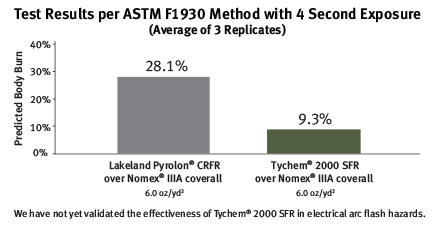
Tychem® 2000 SFR garments also provide an effective barrier against a range of inorganic acids and bases as well as industrial cleaning chemicals and particles. They're an ideal option for keeping workers safe from chemicals, while not compromising the flame protection of fire-resistance clothing worn beneath them. Applications include: refineries, petrochemical plants, laboratories, hazardous maintenance operations.
- Respirator-fit hood lined with ProShield® 6 SFR fabric.
- Covered, braided elastic at hood.
- Nylon zipper with large metal pull
- Chin flap with double-sided adhesive tape
- Covered, braided elastic openings at wrist and ankle for tighter fit.
- Taped seams.
- Zipper features a semi-automatic locking slider allowing the puller to stay down and in a locked position
- Manufactured under specifications that do not contain natural rubber latex
- Meets the U.S. industry requirements for blood (ASTM F1670) and viral penetration (ASTM F1671) protecting against several bloodborne pathogen exposure risks.
AVAILABLE OPTIONS
FINISHED DIMENSIONS
ADDITIONAL EQUIPMENT NEEDED
FABRIC & CHEMICAL RESISTANCE DATA
Physical Properties
Data relating to mechanical performance of the fabrics used in DuPont chemical protective clothing, listed for the selected garment according to the test methods and relevant European standard, if applicable. Such properties, including abrasion and flex-cracking resistance, tensile strength and puncture resistance can help in the assessment of protective performance.
